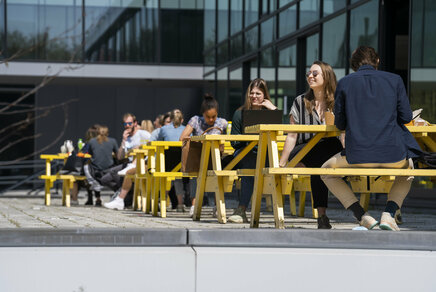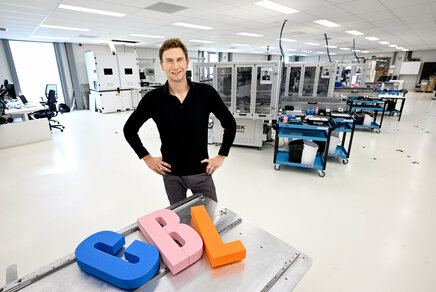Millions for research on issues from Dutch Research Agenda
TU/e involved in projects on renewable offshore technology and more sustainable healthcare, among others.
![[Translate to English:] [Translate to English:]](https://assets.w3.tue.nl/w/fileadmin/_processed_/2/a/csm_2536_4627798e78.jpg)
Several TU/e researchers are involved in projects that have each received several million euros in funding as part of the Dutch Research Agenda (NWA). The projects focus on a soft robot heart for heart patients, better transport networks, more sustainable healthcare, renewable offshore technology and the application of AI in the treatment of depression.
NWO announced yesterday which consortia can start working on scientific and societal breakthroughs on topics identified by questions from society in the NWA.
The consortia contain a wide representation of knowledge organizations as well as societal partners, varying from public parties such as Dutch and international museums, hospitals, universities and knowledge institutions, to foundations, patient associations and other citizen initiatives, municipalities, provinces and government ministries. Industry is also well represented.
Below is an overview of the honored projects where TU/e is a member of the consortium, with the allocated amount and, where known, the TU/e researchers involved.
Renewable offshore technology
HybridLabs helps accelerate the deployment of offshore renewable technologies for both electricity and hydrogen production, hence addressing the energy transition needs whilst also strengthening the offshore food and ecological transitions. It also positions the Dutch knowledge and innovation chain strategically in the Irish Atlantic Coast, which represents a premier opportunity for floating wind energy.
HybridLabs’ backbone is a unique nation-wide infrastructure of hybrid experimental facilities, simulators, and offshore demonstration sites, learning from one another, through new data- and physics- driven approaches. Knowledge exploitation is achieved across a range of societal partners, including industry, policy makers, NGOs, and citizens.
Title: HybridLabs - Accelerating Dutch innovations in offshore renewables through data-driven hybrid labs
Amount awarded: 10.4 million euros.
TU/e researchers involved: Rianne Valkenburg, Jeroen Schepers (department Industrial Engineering & Innovation Sciences), Stefanie Gillmeier (department Built Environment)
Soft robot heart for heart patients
Worlwide, 23 million people suffer from heart failure. For advanced heart failure, heart transplantation is the gold standard. However, due to the limited availability of donor hearts, waiting lists are long and many patients die while on the waiting list. The consortium develops the Holland Hybrid Heart (HHH): the first functional artificial organ.
The HHH is a soft robotic heart with an innerlining of the patient’s own cells. Together, the HHH resembles the healthy human heart as closely as possible. This safe alternative to a donor heart is essential to offer a lifesaving solution for thousands of heart failure patients.
Title: HOLLAND HYBRID HEART, combining tissue engineering and soft robotics to build a biocompatible artificial heart that offers a future to heart failure patients
Amount awarded: 10.4 million euros.
TU/e researchers involved: Carlijn Bouten (department Biomedical Engineering), Bas Overvelde (department Mechanical Engineering), Frans van de Vosse (department Biomedical Engineering)
More sustainable healthcare
The healthcare sector accounts for 7% of the CO2 footprint of the Netherlands. In response, the Dutch government has called for more environmentally sustainable healthcare. The project ESCH-R addresses this challenge with its mission to accelerate the adoption of circular interventions in hospitals and thereby lower the ecological footprint of healthcare.
The research question of the project is: How can hospitals move away from single use medical consumables to make the transition towards circularity? Together with their societal partners, the interdisciplinary team will develop circular, safe and scalable strategies. In the long-run, the ESCH-R project contributes to a sustainable and resilient health system.
Amount awarded: 5.3 million euros
Title project: Evidence-based Strategies to create Circular Hospitals: Applying the 10-Rs framework to healthcare (ESCH-R)
TU/e researchers involved: Vikrant Sihag, Duygu Keskin and Myriam Cloodt (department Industrial Engineering & Innovation Sciences)
Better transport networks
Social support for the external effects and expansion of transport systems is declining. The current approach to improving transportation, the market structure, and chain governance does not lead to optimal use of the available capacity.
The platform economy offers opportunities to coordinate supply and demand in transport networks better, but it also carries risks if a platform provider itself becomes too dominant. In this project, the researchers develop the generic functionality and preconditions for online platforms for arranging and booking services from multiple providers and apply them to intermodal transport networks.
Title project: “It's a cargo match!...” Attaining waste-free and effective freight transport systems by seamlessly matching - demand and supply with inclusive, smart, and green-oriented booking platforms
Amount awarded: 4.9 million euros.
TU/e researchers involved: Ksenia Podoynitsyna (JADS)
Application of AI in the treatment of depression
Depression is the leading cause of disability. Patients receive treatment on a trial-and-error basis because it is unknown which treatment will benefit a patient. The BOOST Depression consortium will use artificial intelligence to develop biomarkers that can predict treatment outcome and guide the selection of the best treatment for each patient. This is expected to double the treatment success rate, shorten treatment trajectories, and reduce health care costs.
Title project: BiOmarkers tO perSonalise Treatment of depression (BOOST depression)
Amount awarded: 4.6 million euros.
Latest news


